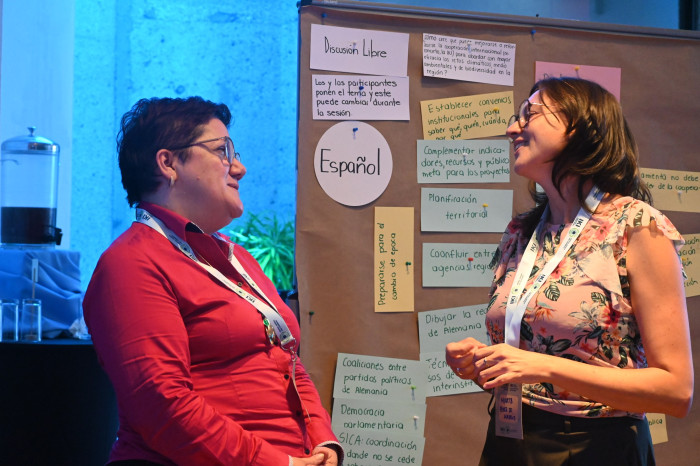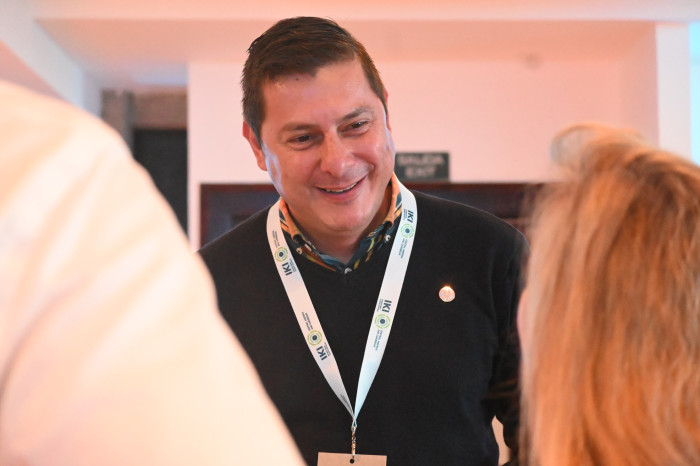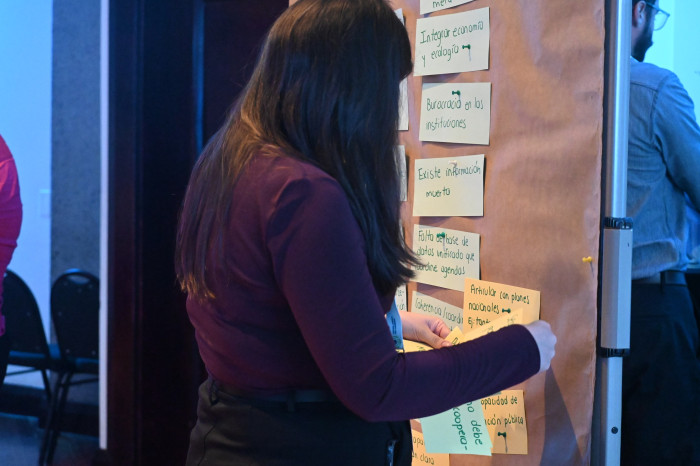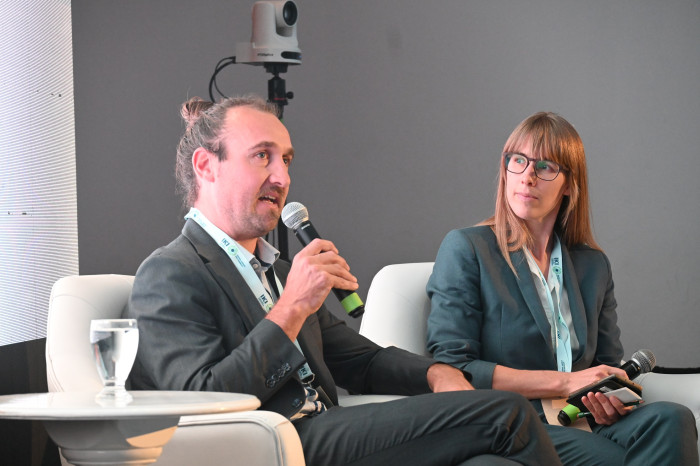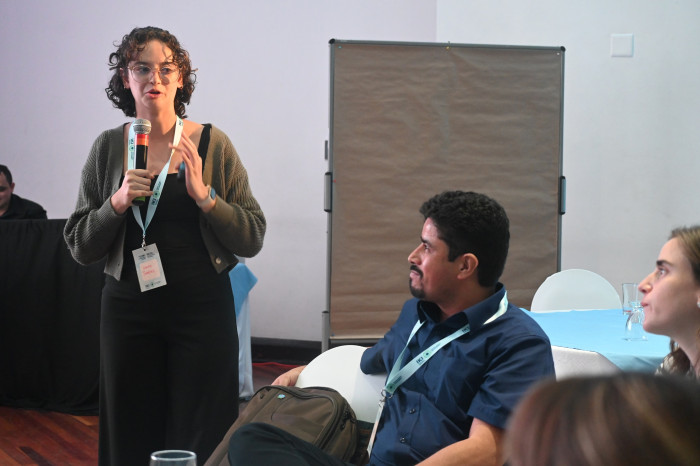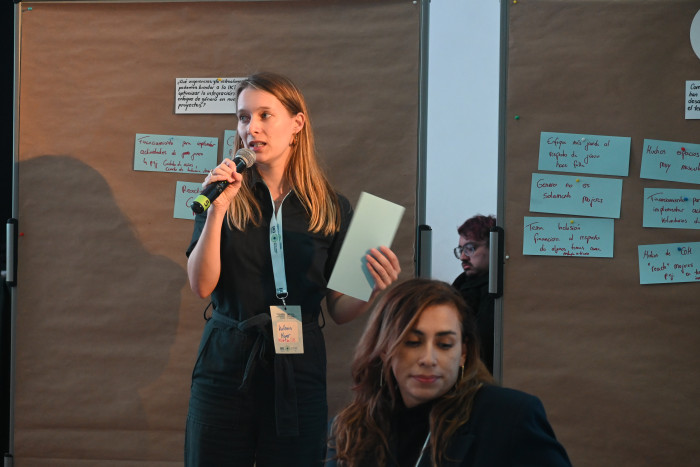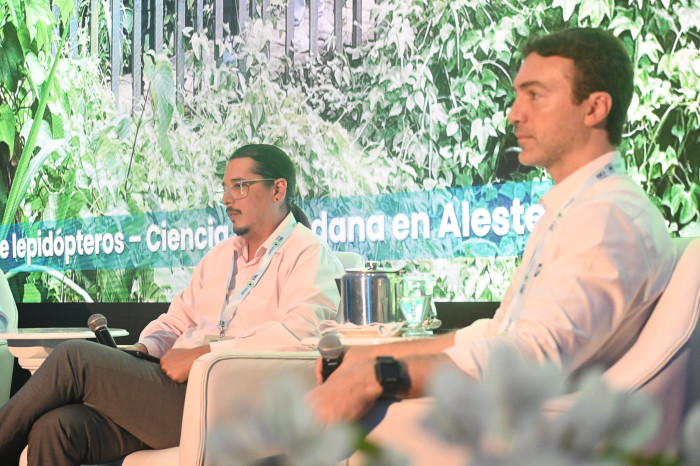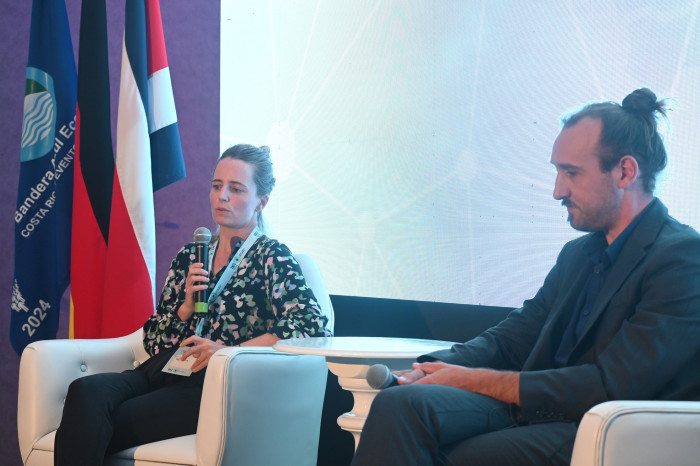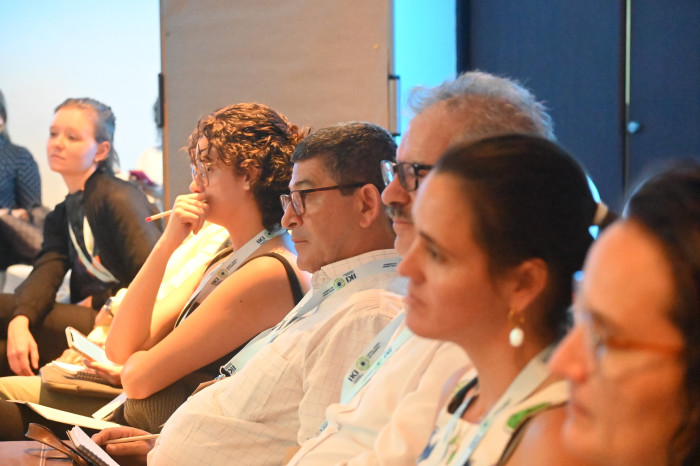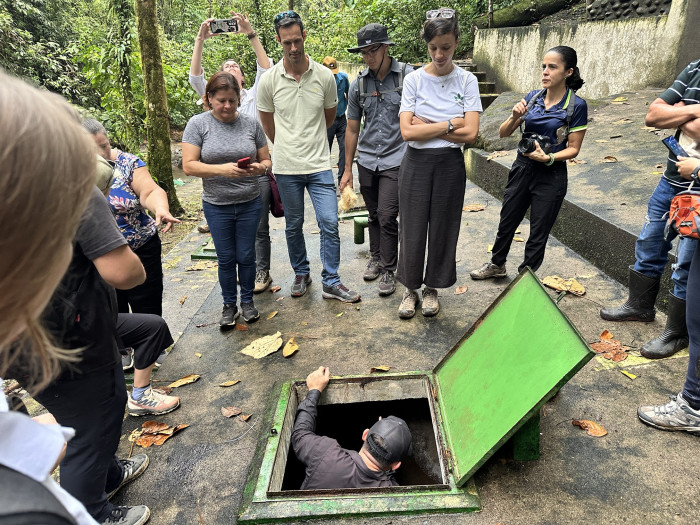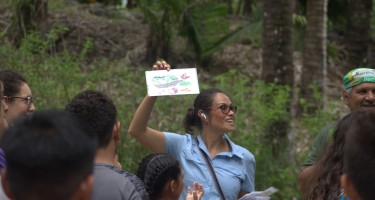Proyectos IKI en Centroamérica y Caribe fortalecen cooperación regional
Entre el 17 y 19 de setiembre de 2024, San José, Costa Rica reunió a más de 100 personas de organizaciones implementadoras, contrapartes y personas beneficiarias de 24 proyectos de cooperación financiados por la Iniciativa Climática International (IKI) del gobierno de Alemania, para intercambiar logros y buenas prácticas para multiplicar, entrelazar y replicar acciones sostenibles en la región.
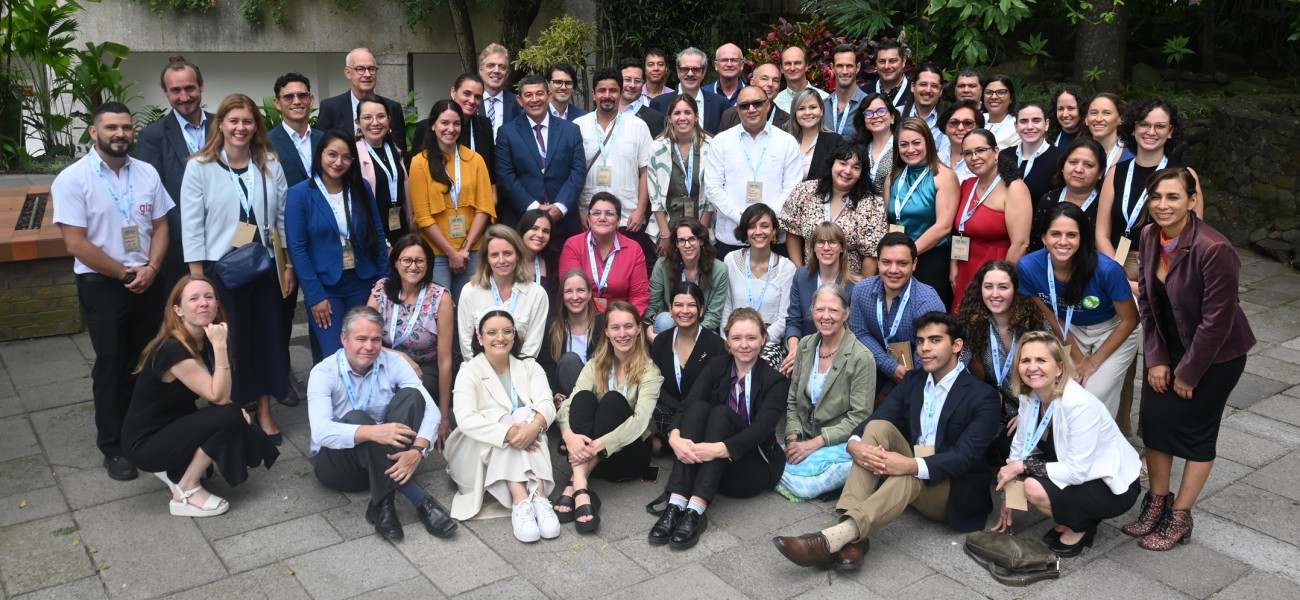
© Melisa Jerez, ACCIÓN Clima / GIZ Costa Rica
Día 1: Creación de conexiones
Múltiples espacios de networking abrieron la oportunidad de romper el hielo, entrar en diálogo y conocer el portafolio actual en la región. Luego, grupos de discusión estratégica abrieron puertas a intercambiar sobre cambios de políticas, retos y desafíos, cooperación regional, y mecanismos de financiamiento, para compartir experiencias entre proyectos, pero también dar retroalimentación y sugerencias a la IKI para el futuro desarrollo de la cooperación en Centroamérica y el Caribe.
Las y los participantes resaltaron la preocupación por las brechas en el financiamiento a iniciativas de conservación marina, los cambios políticos que han afectado a la región, pero también propuestas, como establecer más proyectos de cooperación triangular, y buscar mecanismos para obtener información científica y política más actualizada que faciliten la implementación de proyectos e identificación de prioridades en la región.
© ACCIÓN Clima / GIZ Costa Rica
Día 2: Discusión e intercambio técnico
Durante el segundo día, sesiones temáticas paralelas organizadas por proyectos IKI y la ZUG fomentaron la discusión técnica y permitieron profundizar en acciones concretas, logros y lecciones aprendidas. Conocé las sesiones a continuación:
Jean Pierre Morales, del Programa de las Naciones Unidas para el Desarrollo (PNUD), diseñó un espacio para debatir cómo aplicar y ampliar las recomendaciones del Grupo de Trabajo sobre Divulgación de Información Financiera Relacionada con la Naturaleza (TNFD) en las estrategias de inversión. Con el apoyo de especialistas en finanzas sostenibles y biodiversidad, el objetivo era construir propuestas que permitan a los inversores alinear sus flujos financieros con la naturaleza.
Petra Nieland, de la Oficina IKI de la ZUG, y Kathrin Meyer, asesora de seguimiento y gestión del conocimiento del proyecto ACCION Clima de la Cooperación Alemana al Desarrollo GIZ, promovieron un espacio de intercambio y diálogo sobre el seguimiento y evaluación de los proyectos IKI.
Los participantes identificaron los principales retos a los que se han enfrentado en materia de seguimiento y evaluación en sus proyectos, como indicadores difíciles de evaluar debido a las herramientas necesarias, proyectos con un gran número de socios que hacen compleja su gestión, y las cambiantes realidades políticas de los países que pueden afectar a los avances en la ejecución de los proyectos. Se acordó solicitar a IKI reuniones progresivas para replantear indicadores que faciliten el seguimiento en los proyectos de mitigación y crear más espacios para el intercambio de buenas prácticas entre proyectos, de manera que cada iniciativa pueda tener un mayor impacto en la región.
Dos de los proyectos más pequeños presentes en el taller abordaron un tema importante: Joan Anne Kleypas y Laura Jiménez, de la Asociación Raising Coral de Costa Rica, y Giselle Brady, de la Asociación Islas de la Bahía de Honduras, invitadas a compartir experiencias emocionales relacionadas con la pérdida de biodiversidad y a debatir posibles soluciones que animen a seguir adelante, así como sugerencias para afrontar estas adversidades.
Cómo lograr la esperanza colectiva y reconocer que las personas son parte de la naturaleza y la visión de un futuro mejor fueron algunas de las necesidades identificadas, mientras que espacios para compartir sentimientos, esfuerzos de educación y reconocer que trabajar en el tema tiene impactos a largo plazo fueron algunas de las soluciones propuestas.
Erick Brenes, consultor del Proyecto NDC Action del Programa de Naciones Unidas para el Medio Ambiente (PNUMA), facilitó una sesión en la que valoró cómo, dadas las condiciones actuales del mercado, es necesario un instrumento financiero mixto innovador para lograr la transición energética de la industria en Costa Rica. A través de una contextualización del sector financiero costarricense y sus necesidades, se abrió un espacio de discusión sobre cómo actuar en el escenario actual.
Las asesoras técnicas de GIZ Kathrin Meyer y Catalina Molina del proyecto ACCIÓN Clima, así como Josefina Mena y Diana Ramírez del programa EbA LAC, propiciaron un espacio de reflexión conjunta sobre cómo integrar y transversalizar el género en los proyectos de cooperación internacional que trabajan en biodiversidad y cambio climático.
En grupos de discusión, las participantes destacaron los esfuerzos ya realizados para integrar grupos de trabajo en temas de género, estudiar la participación de las mujeres en diferentes sectores, fortalecer el liderazgo femenino y visibilizar el trabajo de las mujeres en sus comunidades. Quienes participaron en el espacio destacaron que aún queda trabajo por hacer para incluir a la población LGBTQ+, así como para lograr una participación más equitativa de las mujeres en espacios y actividades, sin perder de vista su labor de cuidado.
En un contexto en el que los participantes pusieron de manifiesto las lagunas existentes entre la protección terrestre y la marítima, Andrés Méndez y Valeria Zumbado, asesores técnicos del proyecto Transforma-Innova de la GIZ, trataron de destacar la importancia, los retos y las oportunidades de un enfoque integrado entre el sector terrestre y el marino mediante la aplicación de buenas prácticas, su medición y la vinculación con cadenas de valor diferenciadas.
Día 3: De la teoría a la práctica
Posterior a dos días de discusión e intercambio, fue hora de conocer impactos concretos en el campo. Los y las participantes viajaron al cantón de Sarapiquí, así como la zona de Los Santos, con el fin de conocer de primera mano el trabajo y los resultados de los proyectos EbA LAC en la implementación de medidas de adaptación basadas en ecosistemas, y Transforma-Innova, quienes brindan asesoría técnica a los y las caficultores de Costa Rica en producir un producto sostenible y bajo en emisiones (leer más aquí).
Un evento para poner en práctica la sostenibilidad
Por primera vez, el equipo organizador del evento de parte de la GIZ, sometió la actividad al proceso de certificación del Programa Bandera Azul Ecológica de Costa Rica en su categoría de Eventos sostenibles.
Mediante acciones como la coordinación con la sede del evento para garantizar una adecuada gestión de los residuos, el agua y la energía, el establecimiento de un menú vegetariano, y un amplio programa de reutilización con los materiales, entre otras, se logró alcanzar la nota máxima de 100 puntos.
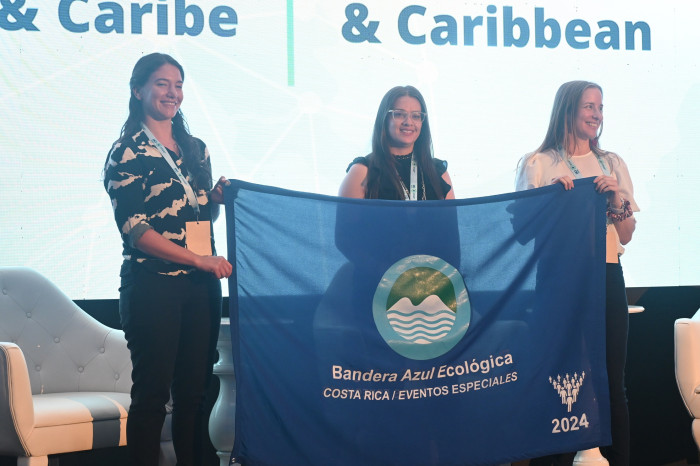
© GIZ Costa Rica
El encuentro regional anual es organizado por el proyecto ACCIÓN Clima de la Cooperación alemana para el desarrollo GIZ, que funge como interfaz entre el donante alemán y los proyectos de cooperación en ejecución en Centroamérica y el Caribe.
- País: Antigua y Barbuda, Bahamas, Barbados, Belice, Costa Rica, Cuba, Dominica, El Salvador, Granada, Guatemala, Guyana, Haití, Honduras, Jamaica, Nicaragua, Panamá, República Dominicana, San Cristóbal y Nieves, San Vicente y las Granadinas, Santa Lucía, Surinam, Trinidad y Tobago
- Proyecto:
- Contacto:
Equipo interfaz IKI
